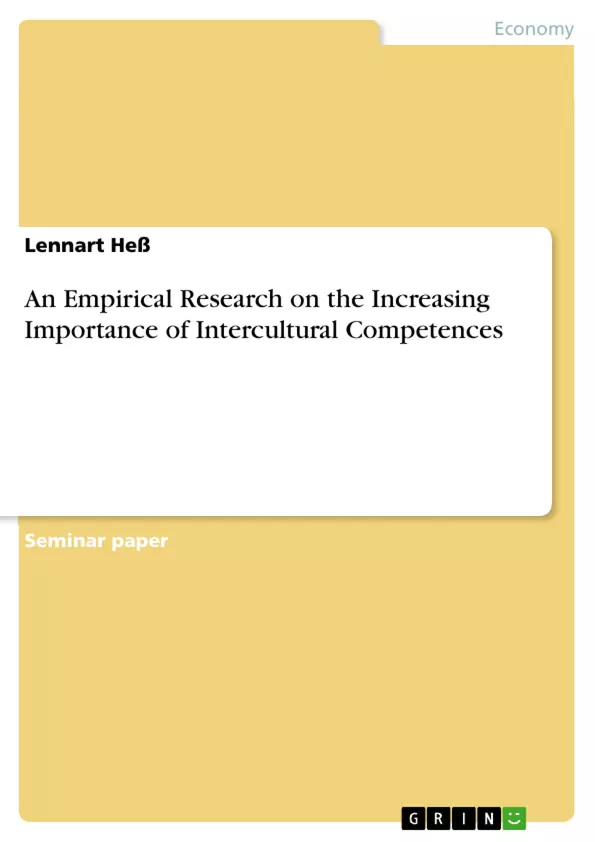The present research paper aims to reveal the importance of intercultural competences. Despite the world moving continuously closer together and the gradual omission of strict boundaries, these competences are rarely communicated within educational institutions. Including an empirical research on peoples’ intercultural competence, this research paper delivers different approaches to improve one’s competence and defines the most suitable institution to communicate these skills. Last but not least the author examines his hypothesis that people tend to overestimate their personal intercultural competence.
There are boundaries separating each country from another, but some of them are by far less strict than a couple of years ago. Free trade areas in Europe, Asia or America already readjust these boundaries when it comes to international trade. The European Single Market further allows all members of the union to work and to live permanently in another members’ state. On both levels, the world is moving closer together and nowadays, countries already experience an omnipresent influence of foreign cultures.
Different country equals different culture. There is a unique culture in every country that explains the population’s way of thinking, its actions or values. Social rules in one country might be the opposite in another one. There are lots of differences people should be aware of when living harmoniously side by side with people from other origins.
On the basis of the increasing multiculturalism and internationalisation everyone will sooner or later be confronted with foreign countries, cultures or their economic influence. The fact that we have to come along with alien cultures and that we have to deal with new behaviours might evoke both, pleasure and discomfort. Nevertheless, it shows that in times of globalisation understanding and interpreting foreign cultures’ actions is indispensable. Being interculturally competent has become fundamentally important.
Inhaltsverzeichnis (Table of Contents)
- Introduction
- Research problem and purpose
- Structure of the research paper
- Theoretical Framework
- Culture and its five dimensions
- Culture
- Hofstede's Cultural Dimensions
- Cultures' affects on international negotiations
- Intercultural Competence
- Definition
- Importance of intercultural competence
- How to improve intercultural competence
- Empirical Survey on Intercultural Competences
- Research methods
- Analysis of the questionnaire
- Interpretation and recommendation
- Critical acclaim
- Conclusion
- Summary
- Outlook
Zielsetzung und Themenschwerpunkte (Objectives and Key Themes)
The research paper aims to highlight the growing importance of intercultural competence in today's globalized world. It explores the lack of emphasis on intercultural competence in educational institutions despite its increasing relevance. The research paper also delves into the concept of intercultural competence, its definition, and strategies for improvement. It examines the relationship between intercultural competence and cultural dimensions, particularly focusing on Hofstede's framework. The paper further investigates individuals' self-perception of their intercultural competence through an empirical survey.
- The significance of intercultural competence in a globalized world
- The role of education in fostering intercultural competence
- The relationship between culture and intercultural competence
- The application of Hofstede's Cultural Dimensions in understanding intercultural interactions
- An empirical investigation of individuals' self-assessment of their intercultural competence
Zusammenfassung der Kapitel (Chapter Summaries)
The introduction establishes the research problem and purpose. It highlights the increasing importance of intercultural competence in a globalized world and the need to understand diverse cultures. The theoretical framework explores the concept of culture and its five dimensions, including Hofstede's cultural dimensions. It also delves into the definition and importance of intercultural competence, emphasizing its relevance in international negotiations.
The empirical survey on intercultural competences outlines the research methods used to gather data and analyze the questionnaire. It focuses on interpreting the results and providing recommendations for improving intercultural competence. The chapter also includes a critical acclaim section.
Schlüsselwörter (Keywords)
The key terms and focus topics of this research paper include intercultural competence, cultural dimensions, Hofstede's framework, globalization, international negotiations, and empirical research.
Frequently Asked Questions
Why is intercultural competence increasingly important?
Globalization and internationalization mean that people are constantly confronted with foreign cultures in both personal and economic contexts, making the ability to interpret these cultures indispensable.
What are Hofstede's Cultural Dimensions?
Hofstede's framework identifies dimensions such as power distance, individualism vs. collectivism, and uncertainty avoidance to explain cultural differences in thinking and action.
Do people tend to overestimate their intercultural competence?
The research examines the hypothesis that individuals often rate their own intercultural skills higher than they actually are, revealing a gap between self-perception and reality.
How can intercultural competence be improved?
Strategies include targeted education, exposure to foreign environments, and training in cultural awareness to better understand social rules and values of other origins.
How does culture affect international negotiations?
Different cultural backgrounds influence negotiation styles, decision-making processes, and the importance of relationship-building, which can lead to success or failure in global trade.
What role do educational institutions play in this context?
The paper highlights that despite its relevance, intercultural competence is rarely communicated sufficiently within traditional educational settings, calling for better integration into curricula.
- Citation du texte
- Lennart Heß (Auteur), 2015, An Empirical Research on the Increasing Importance of Intercultural Competences, Munich, GRIN Verlag, https://www.grin.com/document/322858



